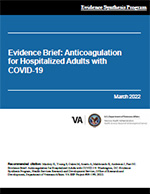
Recommended Citation:
Mackey K, Young S, Oakes M, Arastu A, Maldonado E, Anderson J, Parr NJ. Evidence Brief: Anticoagulation for Hospitalized Adults with COVID-19. Washington, DC: Evidence Synthesis Program, Health Services Research and Development Service, Office of Research and Development, Department of Veterans Affairs. VA ESP Project #09-199; 2022.
Download PDF: Brief, Supplemental Materials
Intermediate-dose anticoagulation, but not therapeutic anticoagulation, may be associated with a small mortality benefit compared to standard thromboprophylaxis among hospitalized adults with COVID-19. Our confidence in these findings is low, primarily due to study methodological inconsistencies and limitations. COVID-19-specific evidence on bleeding risk is limited but sufficient to conclude that higher doses of anticoagulation are likely associated with a dose-dependent increase in bleeding risk among hospitalized adults with COVID-19.
Due to an increased risk of thrombotic events, some adults hospitalized with COVID-19 have received higher anticoagulation doses than are typically used for standard thromboprophylaxis. This rapid review aimed to synthesize available evidence on the benefits and harms of intermediate-dose and therapeutic-dose anticoagulation compared to standard thromboprophylaxis among hospitalized adults with COVID-19 and examine whether benefits and harms vary by medication, patient characteristics, or disease factors.
Based on a literature search through October 12, 2021, we identified 8 relevant RCTs and 37 cohort studies. Intermediate-dose anticoagulation (doses between those used for prophylaxis and treatment of diagnosed thrombotic disease) may be associated with a small mortality benefit compared to standard thromboprophylaxis among hospitalized adults with COVID-19 but does not appear to reduce the risk of thrombotic events. In contrast, therapeutic-dose anticoagulation may reduce the risk of thrombotic events but does not appear to reduce mortality. Our confidence in these findings is low, primarily due to study methodological inconsistencies and limitations. COVID-19-specific evidence on bleeding risk is limited but sufficient to conclude that higher doses of anticoagulation are likely associated with a dose-dependent increase in bleeding risk among hospitalized adults with COVID-19. Important gaps exist in the evidence and future research is needed to better understand if and when higher-dose anticoagulation is beneficial.
Evidence Brief: Anticoagulation for Hospitalized Adults with COVID-19 (Management eBrief)